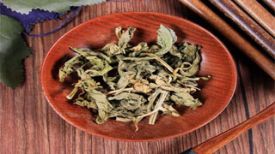1. "The Compendium of Materia Medica" states: "The ten herbs of this herb can be used lightly to remove excess, and belong to the categories of ephedra and kudzu root. Gai ephedra is a medicine of the Sun meridian, which also enters the Lung meridian and controls the skin and hair; kudzu root is a medicine of the Yang ming meridian, which also enters the Spleen meridian and controls the muscles. Therefore, both herbs are light and diffuse, and their effects are vastly different."
2. In the Classic of Materia Medica, it is said that "Ge Gen is the main medicine for dispelling the heat pathogenic factors of Yangming warm diseases. Therefore, it is responsible for quenching thirst, causing excessive body heat and heat blocking the chest and diaphragm, causing vomiting. When it spreads and rises, it has the nature of a wind medicine, and therefore it is responsible for various types of Bi." "For those who suffer from typhoid fever, headache, strong neck and spinal pain, as well as bone pain all over the body, the foot sun is also present, and the evil has not yet entered Yangming. Therefore, there is no thirst syndrome and it should not be taken."
3. The Compendium of Materia Medica states: "Kudzu root is a medicine that clears wind and cold, purifies external evil, relieves muscle heat, and relieves restlessness and thirst. It is also a medicine that helps to dispel stomach fire. After tasting, there are many medicines that can dispel evil, such as Ma Huang pulling out the cold of the sun's camp, Gui Zhi relieving the wind of the sun's guard, Fang Feng and Zi Su dispersing the wind and cold of the sun on the surface, Gao Ben and Qiang Huo dispersing the cold and dampness of the sun on the surface, all of which are called divergent medicines. However, the divergence of Kudzu root also enters the sun and disperses wind and cold, which is different. It is not like Ma, Gui, Su, and Fang, but also like Ma, Gui, Su, and Fang. It is fragrant, warm, and dry Gaoben and Qianghuo are both divergent and have a risk of consuming the blood of the camp
4. The Classic of Materia Medica states: "Thirst quenching, body heat, vomiting, various types of obstruction, qi stimulation, detoxification."
5. "Treatment of typhoid fever, stroke and headache, relieving muscle sweating, relieving itching, treating golden sores, and relieving hypochondriac wind pain."
Indications
1. Fever on the surface and strong pain in the neck and back: This product is sweet, spicy, and cool in nature, with a light and uplifting effect. It has the functions of sweating, relieving the surface, relieving muscles, and reducing fever. This product can be used for fever caused by external factors, regardless of wind cold or wind heat.
2. Measles opacity: This taste is spicy and cool, with the ability to dispel evil, relieve muscle and fever, and penetrate measles.
3. Heat and thirst, yin deficiency and thirst quenching: This product is sweet and cool, and in clearing heat, it can also stimulate the rise of spleen and stomach yang clearing qi, and has the function of generating fluids and quenching thirst.
4. Heat release and dysentery, spleen deficiency and diarrhea: This taste is spicy and can elevate and clear yang, stimulate the qi of the spleen and stomach to clear yang, and play a role in stopping diarrhea and dysentery.
5. Kudzu root can directly dilate blood vessels, reduce peripheral resistance, and have a significant antihypertensive effect, which can effectively alleviate the symptoms of neck tightness in hypertensive patients. Therefore, it is commonly used in clinical practice to treat neck pain in hypertensive patients.
Usage and dosage
Internal administration: decoction, 9-15g. It is suitable for relieving muscle, fever, rash, and promoting diuresis, while it is suitable for promoting yang and stopping diarrhea by simmering.
Contraindications for the compatibility of Chinese and Western medicine:
1. When used together with antihypertensive drugs, hypoglycemic drugs, and cerebrovascular vasodilators, the dosage should be reduced.
2. Kudzu root can antagonize the vasoconstrictive effects of adrenaline and isoproterenol, so it is not suitable to use them together.
Attention: Avoid using for those with deficiency cold, and use with caution for those with stomach cold and vomiting.
Suitable audience:
1. Kudzu root is suitable for patients with external fever, headache, strong pain in the neck and back, thirst, thirst, measles, dysentery, diarrhea, dizziness, headache, stroke, hemiplegia, chest pain, and alcohol poisoning.
2. Western medicine diagnosed colds, influenza, acute bronchitis, acute tracheitis, viral pneumonia, backache, convulsions, etc. as exogenous symptoms, measles with exogenous pathogens, infectious erythema (the fifth disease), hand foot and mouth disease, relapsing fever, diabetes, diabetes insipidus, etc. as heat diseases that damage fluid and lack of yin fluid, infectious diarrhea, functional diarrhea, other food poisoning (bacterial), other protozoan intestinal diseases, intestinal pollution caused by other pathogens, bacterial enteritis, etc. as spleen deficiency or gastrointestinal damp heat.
Unsuitable audience: Not yet clear.
Pharmacological effects:
Pueraria root decoction, alcohol extract, total flavonoids, daidzin, and puerarin can all counteract acute myocardial ischemia caused by posterior pituitary hormone. Total flavonoids of Pueraria lobata can dilate coronary and cerebral blood vessels, increase coronary and cerebral blood flow, reduce myocardial oxygen consumption, and increase oxygen supply. Kudzu root can directly dilate blood vessels, reduce peripheral resistance, and have a significant antihypertensive effect, which can effectively alleviate the symptoms of tight neck in hypertensive patients. Puerarin can improve microcirculation, increase local micro blood flow, and inhibit platelet aggregation. Pueraria lobata has a wide range of beta receptor blocking effects. It has a significant spasmolytic effect on the isolated intestinal tract of mice and can counteract intestinal spasms caused by acetylcholine. Kudzu root also has a significant antipyretic effect and a slight hypoglycemic effect.
Kudzu root
Release time:2024-05-26 14:07:25
Reading:211
Word Count:6180
Subscribe to email


